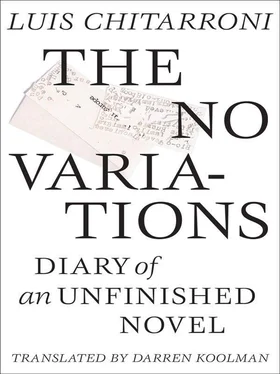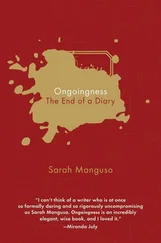If — this very morning — Mr. and Mrs. Smith were to arrive again at his door, exhibiting all the symptoms of delirium tremens, despite their avowed sobriety, and if they came recommended by the same authority — the same Lucien Sordido who was unable to exchange a broken reputation for a new one— he would certainly receive them with the same apprehension, the same mistrust, and the same pretense of goodwill as during that first interview, suspecting that, due to Sordido’s notoriety as an author of operatic librettos (a craft not dissimilar to his own: the only variant being the notoriety), they were introduced to one another at a party, and considering them too dull and tasteless to be among his own cast of caricatures, or believing, almost superstitiously, that they were practicing the art of evasion, of dissimulation, and that this was the means by which truly singular personalities concealed their exceptionality, he recommended them to him — perhaps naïvely — as living models. Living models, indeed, but for a novelist. And as always, he —disinterestedly — availed of them.
If his memory were as reliable an instrument as his imagination, he would have recalled that Lucien Sordido had in fact sent the couple at his request, and that he had afterwards muttered to Sordido in a restaurant — during one of those myriad occasions they dined out that year — a slight of their aristocratic pose , which required an almost anonymous fealty to borrowed habits, a wavering confidence in the performance of those habits, and a similar irregularity in the upholding of one’s convictions and scruples.
For now, he could dream of Mr. George Smith, with his threadbare coat and perfumed breath, as a citizen borne of his own inventive memory: as a guide or cicerone to a gallery of facetiae chosen with more haste than judgment, and afterwards replaced with variants whose verisimilitude relied more on his degree of inebriation than on the appraisal of critics, or, above all, of future biographers. The biographer, in particular — being tethered to the past — is a class of professional whose imagination retards his recognition of the present moment, though this is the first door on which every casual observer knocks. As George himself — although not a biographer — had done …
By contrast, he was never wanting in charm and elegance; indeed, it could be said he had more than his share, something he made pains practically to exhibit during postprandial conversation, while enjoying his demitasse, when a distant onlooker might imagine he was descended from rural nobility; and this was justified, almost as much as the paradox of Burgess’s mundane beauty, or his own treatment of realistic tragedy according to the conventions of fantasy, imagining there was neither conflict nor contradiction. True, conflict — which was real in the case of the Smiths — brought with it a kind of superfluous scaffolding, so that the course of events, whether suspended or delayed by that cumbrous stage machinery, forced him to anticipate every flaw, every error in that machinery. How instructive and misleading are errors! How the terricolous Hardy erred in believing he had to bury his hands in the loam of misfortune to prove that he had suffered! Dirt under the nails was the ultimate proof. But Jurisprudence was for him a secondary calling, one whose emblems solicitously evoked a fealty to justice and the public weal, and whose symbolic acts were so amply displayed during the ceremonial openings of law firms, whose founders took care to choose a splendid Latin motto to suit the heraldic monogram surmounting the doors of their establishment, an establishment whose end was not justice but commerce.
In any event, planning the married couple’s future allowed him to distance himself from a problem only Addison or Ibbetson could resolve, each one of whom dealt with the kinds of technicalities he believed were at the core of the issue, but which he could never fully apprehend, since, from the time of his earliest instruction until his removal from the Polytechnic school in Zurich, such things were always lost on him due to his natural inaptitude for systemized learning. No, for him, any attempt at indagation or inquiry into such matters would condemn him to circumambulation, frustration, and endless raving. And, after some time following his own steps, he would find himself once again going down the path already beaten by Musset, who discovered il s’absente trop de l’Académie parce qui’l s’ absinthe trop . Although, he could adduce in his defense a monastic temperance so commendable, the casual drinker’s tipsiness — or if he be Irish, the not so casual, for an Irishman would pursue the matter along an entirely different course without ever encountering a Musset — would seem Bacchic by comparison. In this sense, his sorrow, grandiosity, and style were all consistent. And someone who wasn’t even intelligent, but were only a link in a system devised by others, a man who maintained his place only by fear and trembling, would have no difficulty in recognizing him. Even in anticipating him. This is style, and cannot be taught at the academy. If he could hold a conversation with his brother without the usual pretenses or recriminations, they could surely come to some agreement. And especially now he had begun reading The Varieties of Religious Experience .
There was always gossip concerning the two of them, whispers sprayed like shrapnel, for without at least one of their deaths, there cannot be an autopsy, or afterwards, a museum of commemoration. It was said that it was impossible to mistake one for the other, since “one was a novelist who wrote treatises on psychology,” and the other, “a professor of psychology who wrote novels.” The derisive chiasmus of fools.
Tomorrow, enough
The other benefit was to incur an immeasurable indebtedness to life for visiting on him so many woes. Curious he would think it a life’s work, and not a novelist’s, to repay that debt, as if his writing could remedy or at least assuage the wounds he accumulated with experience. What is certain is that all his possessions together could not discharge that debt, of which the most valuable, the most powerful, was also the least ponderous — his splendid art, his sad profession.
The days passed, the ceremonies were repeated, the guests arrived and then departed, but it was only after they were gone that blood once again engorged the arid channels of his heart. So with impatience arising from bewilderment of desire, he awaited the arrival of the gentlemen guest who would prevail on his hospitality. Or, in the event he didn’t come, he would celebrate the prospect of a full day dedicated to solitude — a Saturday — during which, after initial speculations as to why his guest had failed to come, his imagination would be free to follow its own course. Once, a fellow conversationalist — a Spaniard, he recalls — made the pronouncement in English that Saturdays were days of the imagination, speaking with such orotundity, his words seemed to dress the invisible air in the flounces of that paralogism. Curious: time requires more space than space itself for those who were once close to become estranged. But for him to be estranged from those spaces of time when he was made the victim of posturing and casuistry, requires nothing at all. But it doesn’t matter. Trop . His account of the most decisive days was now complete, although it was lacking in vigor, although it seemed puerile, and vacuous, and although his fingers reached into the pit but did not feel the loam.
And though a guest were to arrive, expectedly or unexpectedly — or not, since an absence, expected or unexpected, was always welcome — solace remained his constant companion (“his mutual consul,” they said, mockingly, of Dickens), a friend that eased the dyspepsia of too much living, enabling him, without guilt of pride, to etch — for any guest, any companion — a portrait of himself that were as crude as a silhouette or complete as an incarnation. Without guilt of pride, yes, but pursuant to what he believed was his legitimate hatred of the real and its eternal trappings. Thence, on that particular August afternoon, at the hour when the demiurge oft goes handing out empty promises — so many trappings — he resolved, with aristocratic disdain, to ensure his reciprocal and utter destruction.
Читать дальше












